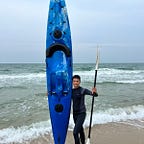A Case for Exploratory Education
i’ve been using an app called Brilliant to (relearn) Maths, Physics & Logic. it’s very interesting because their approach is founded on exploratory education — a process of starting with a couple of key observations or assumptions that are simply logical and indisputably true (axioms). building upon this, they ask questions about what one can do with these facts.
for example, in the logic 1 course, the narrative is that the main robot has started a theme park, and has two kinds of visitors — Androids that always lie, and Humans that can only tell the truth. the objective of our (cute) protagonist is to weed out the liars from the truth tellers. we do this by deducing what makes logical sense vs what seems contradictory through a series of statements they make about each other.
we started by simply defining two types of actors. using just this fact alone, we learn powerful ways of dealing with information that seems contradictory or is incomplete (through the statements these actors make about each other)
over the series of a few of these narratives, we continue our exploration of what we can do by building up on these facts. we reach a point where we automatically arrive at logical operators, such as syllogisms. we then further reach a point where we reach propositional logic (Venn Diagrams, Mathematical operators etc.) which is the dominant school of Logic in today’s formal education. we arrive at this through a process of asking ourselves simple questions that let us infer new insights and models.
in other words, we synthesized our understanding of Logic as opposed to analyzing a given set of laws to test it.
when I studied Logic in college, our first class started with a definition of Propositional Logic. we were taught the rules of Logic as a list, one after the other, and then a series of examples of (stupid) applications of it. what we essentially did was take the rules of Logic as a given fact, and then applied it in the most basic exercises of unrelated questions that made it impossible to see how one piece of knowledge connected to the next. it became a semester-long process of receiving a series of facts, trying to understand the logic behind these individual facts as best as possible, and failing that just memorizing it to solve the problems given to us.
in other words, we prioritized analyzing the information given to us and synthesizing only solutions based on the problems we were asked to solve.
the true value of an education, if it is to extend beyond academia and research, is in shaping the way we think as opposed to the retention of laws and facts. considering that most of us educate ourselves for self-improvement and growth and not as an intellectual academic exercise, we should look at how to educate ourselves in this exploratory manner that helps us arrive at conclusions rather than accept as gospel the type of things textbooks tell us.
